Space, Satellites, and Democracy

Satellite technology is undergoing rapid advancements, transforming remote communication and opening up new avenues for people around the world to engage more effectively in democratic processes. However, this evolution brings with it a range of challenges and ethical considerations. Recognizing the need for the democracy community to gain insights into these developments, NDI partnered with The Aerospace Corporation to host a one-day workshop on space and democracy and subsequently publish a paper discussing the regulatory and normative frameworks governing space, different use case applications, as well as factors that different stakeholders should consider as they seek to leverage space-based capabilities for their work.
Key takeaways, summarizing thoughts from participants at the workshop, can be found in the newly released Space, Satellites, and Democracy: Implications of the New Space Age for Democratic Processes and Recommendations for Action.
New advancements in satellite technology create opportunities to enhance democratic processes but also raise concerns over misuse.
Democratic processes stand to benefit from new space-based capabilities, particularly Low Earth Orbit (LEO) satellites. These satellites are relatively less expensive to manufacture and launch, making them broadly more accessible to use in various initiatives supporting transparency, accountability, and participation. In the past, satellites have been used to monitor democratic infrastructure and support voter registration, provide evidence of human rights violations, and enhance communication networks in remote or underserved areas. LEO satellites can support these activities with even greater efficiency.
At the same time, increased accessibility of this technology heightens risks around privacy and potential surveillance abuse. The rapid commercialization of space technology has dramatically lowered barriers to accessing satellite capabilities, including sophisticated imaging and remote sensing tools. This has created a complex landscape where powerful surveillance and monitoring capabilities are increasingly accessible to a wide range of actors. In the wrong hands, satellite data—such as location information, maps, and communication logs—could be exploited to infringe on individual privacy. The new affordability of this technology also makes it easier for authoritarian regimes and other bad actors to use these tools for oppressive purposes, both domestically and transnationally.
For years, satellites have enabled connectivity in remote places and provided an uncensored platform for free speech and information dissemination. LEO satellites have the potential to facilitate this kind of connectivity at scale and with greater efficiency. Today, satellite internet can be used to reliably support connectivity in conflict areas, as seen in Ukraine, as well as in closed and closing spaces. By a similar measure, users in digital deserts are now able to bypass traditional connectivity methods and benefit immediately from satellite-enabled connectivity.
Despite these use cases, influence over space-based capabilities and the satellite internet landscape has largely been dominated by a small number of space-faring nations and private sector actors so far, with conflicting interpretations of what constitutes acceptable behavior in space as evidenced by growing concerns over space debris and long-term space accessibility.
Thus, concerted action from the global democracy community is needed to prevent the abuse of satellite technology and promote democratic and human rights values in this arena of competition
Balancing divergent interests among different stakeholders will be critical to harnessing the power of satellite technology to advance democracy and freedom.
Various stakeholders and communities—from national governments and parliamentarians, to civil society organizations and industry representatives have distinct interests and, in turn, may behave differently. Ultimately, however, strengthening coordination between different players will be essential to ensuring space-based capabilities are used to support, not undermine, democracy and human rights
Parliamentarians and lawmakers have a crucial role in this conversation, representing the interests of their constituents and helping create the legal frameworks and funding for the development and use of space technologies. Civil society organizations are also central to advocacy efforts as well as efforts to shape policy and regulation by the government. The private sector, on the other hand, is primarily focused on growth and innovation, although some companies demonstrate strong civic-minded principles.
Democratic-minded stakeholders must take proactive steps to work together to reconcile competing incentives and do more to center democratic and human rights considerations as engagement in space ramps up.
The regulatory and normative frameworks governing space and the use of satellite technology are outdated, presenting challenges for democracy and human rights.
On a basic level, international rules for space and the use of satellites are designed to ensure future generations are able to benefit from and have access to space-based capabilities like satellites.
Multilateral agencies, such as the UN Office of Outer Space Affairs (UNOOSA), have long been the main facilitators of global space governance and law, convening stakeholders and supporting cooperation and coordination between spacefaring nation-states. International treaties like the Outer Space Treaty govern most activities in space, but there have been few new binding international rules in over 50 years. As a result, much has been left to the nation-state level, and there is not much convergence in domestic space policies. Moreover, not all countries see space as a global commons. This state of affairs may lead to more space operators adopting “flags of convenience” to circumvent more stringent regulations. The result is likely to be a race to the bottom in regulations, making it easier for bad actors to abuse satellite technology and more likely for the privacy and security of satellite data to be compromised.
Moving forward, many think that we are unlikely to see a new major space treaty in the short or medium term, even though additional legally binding international frameworks are badly needed to keep pace with new advancements and challenges. In the meantime, many saw value in further developing industry standards and non-binding mechanisms to begin to internalize norms, as many have done through the Artemis Accords.
To learn more about this topic please see the full publication.
